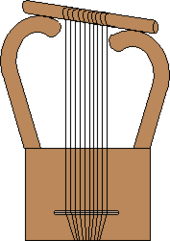| Revision as of 16:35, 2 October 2013 editArmbrustBot (talk | contribs)Bots115,683 editsm →References: re-categorisation per CFDS, replaced: Category:Lost and extinct instruments → Category:Lost and extinct musical instruments using AWB← Previous edit | Revision as of 21:08, 2 November 2013 edit undoEamonnPKeane (talk | contribs)22,498 editsNo edit summaryNext edit → | ||
| Line 14: | Line 14: | ||
| ] showing lyrist, excavated from the same site as the ].]] | ] showing lyrist, excavated from the same site as the ].]] | ||
| The '''nevel''' was a ] in use by the ancient ]. The Greeks referred to it as the ] (νάβλα, cf. Latin ''nabilium'').<ref>Rich, Anthony. ''A Dictionary of Roman and Greek Antiquities.'' New York: D. Appleton & Company. 1874. Page 439.</ref> Much conjecture has been put forth on its exact nature, but it was probably not a standardized instrument. Most hold it to be a form of ], or psaltery. The ] renders the word into English as ] or ], and the ] renders it ].<ref>Neil, James. ''Everyday Life in the Holy Land.'' London: Cassel & Company, Ltd. 19134. Page 218.</ref> The word ''nevel'' means harp in modern ]. | The '''nevel''' or '''nebel''' ({{lang-he|נֵ֤בֶל}} ''nêḇel'') was a ] in use by the ancient ]. The Greeks referred to it as the ] (νάβλα, cf. Latin ''nabilium'').<ref>Rich, Anthony. ''A Dictionary of Roman and Greek Antiquities.'' New York: D. Appleton & Company. 1874. Page 439.</ref> Much conjecture has been put forth on its exact nature, but it was probably not a standardized instrument. Most hold it to be a form of ], or psaltery. The ] renders the word into English as ] or ], and the ] renders it ].<ref>Neil, James. ''Everyday Life in the Holy Land.'' London: Cassel & Company, Ltd. 19134. Page 218.</ref> The word ''nevel'' means harp in modern ]. | ||
| ==See also== | ==See also== | ||
Revision as of 21:08, 2 November 2013
 Ancient Nevel (Harp) Ancient Nevel (Harp) | |
| Classification | String instrument |
|---|---|
| Related instruments | |


The nevel or nebel (Template:Lang-he nêḇel) was a stringed instrument in use by the ancient Hebrew people. The Greeks referred to it as the nabla (νάβλα, cf. Latin nabilium). Much conjecture has been put forth on its exact nature, but it was probably not a standardized instrument. Most hold it to be a form of harp, or psaltery. The King James Version renders the word into English as psaltery or viol, and the Book of Common Prayer renders it lute. The word nevel means harp in modern Hebrew.
See also
References
- Rich, Anthony. A Dictionary of Roman and Greek Antiquities. New York: D. Appleton & Company. 1874. Page 439.
- Neil, James. Everyday Life in the Holy Land. London: Cassel & Company, Ltd. 19134. Page 218.